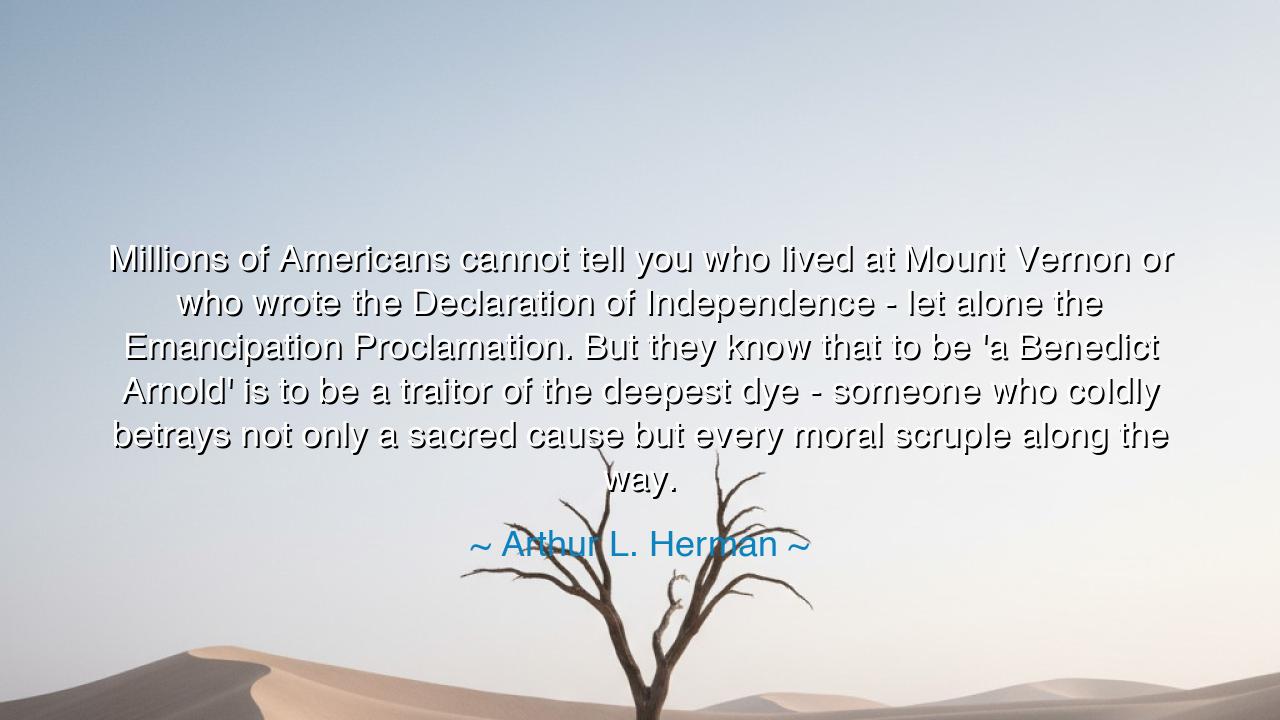
Millions of Americans cannot tell you who lived at Mount Vernon
Millions of Americans cannot tell you who lived at Mount Vernon or who wrote the Declaration of Independence - let alone the Emancipation Proclamation. But they know that to be 'a Benedict Arnold' is to be a traitor of the deepest dye - someone who coldly betrays not only a sacred cause but every moral scruple along the way.






There are names that rise from history like beacons — and there are names that sink into it like stones. Arthur L. Herman, in his reflection on memory and morality, wrote, “Millions of Americans cannot tell you who lived at Mount Vernon or who wrote the Declaration of Independence — let alone the Emancipation Proclamation. But they know that to be ‘a Benedict Arnold’ is to be a traitor of the deepest dye — someone who coldly betrays not only a sacred cause but every moral scruple along the way.” These words are not merely an observation of ignorance, but a lamentation for the soul of a people — a warning that while glory fades, treachery endures.
Benedict Arnold was once a hero of the American Revolution. His name once stood alongside those of Washington and Lafayette. He fought bravely, bled for liberty, and led men through fire and thunder. But envy and ambition poisoned his heart. Feeling unappreciated, he turned against the very cause he had helped to build. For thirty thousand pieces of silver and the promise of power, he sold his honor to the enemy. The man who might have been remembered as a founder became instead the symbol of betrayal. His name outlived his body — but as a curse, not a crown.
Herman’s words remind us that memory does not always favor virtue, but it never forgets betrayal. The human soul, in its deepest instinct, recoils from treachery more than from defeat. A nation may forgive its enemies, but never its traitors. We may forget who signed the great documents of freedom, but the one who betrayed them will forever be remembered. Thus, the name “Benedict Arnold” has become a monument of warning — not carved in stone, but in the conscience of humanity.
This truth is not bound by time or nation. In every age, in every land, the betrayer’s name burns brighter in infamy than the hero’s in glory. Judas Iscariot, who sold the Son of Man for silver, is remembered by more tongues than many saints. Brutus, who plunged his blade into Caesar, is studied not for his speeches, but for his treachery. The ages are filled with such echoes — reminders that betrayal is a wound that does not heal, a shadow that follows its maker beyond the grave. For while courage fades into legend, betrayal becomes eternal shame.
And yet, Herman’s quote carries a second sorrow — that the people remember infamy more readily than virtue. They forget Washington, the steadfast soul of Mount Vernon, and Jefferson, who penned the words that gave a nation its voice. They forget Lincoln, whose Emancipation Proclamation broke the chains of millions. But they remember the traitor. This is the paradox of the human heart: we are drawn to darkness even as we fear it. We study the fall of men, but neglect their rise. We gossip of sin more eagerly than we meditate on virtue.
Thus, the quote becomes a mirror — not for Benedict Arnold, but for us. It asks: Why do we remember the betrayer more than the builder? Perhaps because betrayal offends the divine order. When one turns against truth, he rends the very fabric of trust that binds men together. And when trust is broken, civilization trembles. To betray one’s country, one’s friend, one’s faith — that is to wound the sacred covenant that holds humanity upright. Therefore, the name of the traitor lives on as a warning flame — to remind the living of what must never be repeated.
So, my children of thought and memory, let this teaching dwell within you: honor fades unless renewed, but dishonor burns forever. Do not be among those who forget the noble in favor of the notorious. Remember the names of virtue — Washington, Jefferson, Lincoln — not only for what they built, but for the price they paid to build it. Let your own life be a testament of loyalty — to your word, to your people, to the truth. For in the end, it is not the greatness of your victories that will define you, but the steadfastness of your faith when tempted by betrayal.
And if ever the world should offer you the easy path — the path of silver, of deceit, of false advantage — remember the fate of Benedict Arnold. His wealth turned to dust, his name to poison, his soul to exile. For the traitor may live, but he lives as a shadow. Better to die in faith than to live in infamy. Thus, let loyalty be your crown, integrity your sword, and memory your shield — so that when your name is spoken by generations yet unborn, it may not echo in shame, but shine in honor.






AAdministratorAdministrator
Welcome, honored guests. Please leave a comment, we will respond soon